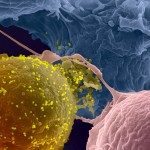Lien vers Pubmed [PMID] – 26401039
J. Virol. 2015 Dec;89(23):12118-30
UNLABELLED: The HIV-1 accessory protein Vpr displays different activities potentially impacting viral replication, including the arrest of the cell cycle in the G2 phase and the stimulation of apoptosis and DNA damage response pathways. Vpr also modulates cytokine production by infected cells, but this property remains partly characterized. Here, we investigated the effect of Vpr on the production of the proinflammatory cytokine tumor necrosis factor (TNF). We report that Vpr significantly increases TNF secretion by infected lymphocytes. De novo production of Vpr is required for this effect. Vpr mutants known to be defective for G2 cell cycle arrest induce lower levels of TNF secretion, suggesting a link between these two functions. Silencing experiments and the use of chemical inhibitors further implicated the cellular proteins DDB1 and TAK1 in this activity of Vpr. TNF secreted by HIV-1-infected cells triggers NF-κB activity in bystander cells and allows viral reactivation in a model of latently infected cells. Thus, the stimulation of the proinflammatory pathway by Vpr may impact HIV-1 replication in vivo.
IMPORTANCE: The role of the HIV-1 accessory protein Vpr remains only partially characterized. This protein is important for viral pathogenesis in infected individuals but is dispensable for viral replication in most cell culture systems. Some of the functions described for Vpr remain controversial. In particular, it remains unclear whether Vpr promotes or instead prevents proinflammatory and antiviral immune responses. In this report, we show that Vpr promotes the release of TNF, a proinflammatory cytokine associated with rapid disease progression. Using Vpr mutants or inhibiting selected cellular genes, we show that the cellular proteins DDB1 and TAK1 are involved in the release of TNF by HIV-infected cells. This report provides novel insights into how Vpr manipulates TNF production and helps clarify the role of Vpr in innate immune responses and inflammation.
